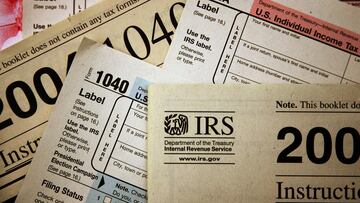Tax Filing 2021: what happens if I don’t file before the deadline?
The IRS can issue financial penalties for late tax returns. Failure to file may also affect upcoming stimulus check and Child Tax Credit payments.


The deadline for 2021 IRS tax filings is drawing closer and the majority have tax-payers have already completed their tax returns for the past year. This year the deadline has been extended by just over two months, meaning that the new date by which to get your tax returns in is Monday 17 May.
This came as the IRS decided that Americans would need longer than usual to get their tax returns done after a year with many new government programmes aimed at offering financial support during the pandemic.
You still have time → This year, the individual income tax filing and payment due date is May 17, 2021. Read more about #TaxDay from #IRS at https://t.co/RwI6wqUbRw pic.twitter.com/5eDdNicSkQ
— IRSnews (@IRSnews) May 10, 2021
IRS Commissioner Chuck Rettig said of the extension: "This continues to be a tough time for many people, and the IRS wants to continue to do everything possible to help taxpayers navigate the unusual circumstances related to the pandemic, while also working on important tax administration responsibilities."
If you do not meet the new deadline there will likely be consequences, with financial penalties and the potential to miss out on stimulus check payments if you do not file your returns.
Read more:
- Guidance for first-time unemployment claimants in New York
- IRS will send unemployment tax break refund in two phases
- Child Tax Credit and Stimulus Checks: how do they differ?
- Montana and South Carolina to cut unemployment payments
IRS issues fines for late tax filings
The IRS can issue financial penalties to individuals for a variety of reasons related to a late tax return filing. Not only that, but any outstanding penalties will accrue interest while they remain outstanding so it is vital that you complete your tax return on time.
The IRS list the following as the most common reasons why penalties are given:
- Failure to file – if you miss the return due date of 17 May 2021, assuming that an extension has not been approved, you can be fined
- Failure to pay – even if your filing is completed on time you can face fines if you fail to pay any outstanding taxes by 17 May 2021. It is worth noting that receiving a filing extension does not necessarily extend the time to pay
- Failure to pay estimated tax payment – if you are required to provide quarterly estimated tax payments, you must make these payments on time
- Dishonoured check – if your bank does not honour a tax payment made on your behalf this can be counted as a missed payment
How can a late tax filing affect stimulus check and Child Tax Credit payments?
Aside from the financial penalties there are other ways in which a late tax filing can affect you. The IRS has overseen the distribution of all three rounds of stimulus checks and will do the same with the new Child Tax Credit system. Both of which are based on information from individuals’ tax returns.
IRS faces backlog of more than 17.1 million tax returns as Tax Day approaches https://t.co/92Byycr4ts pic.twitter.com/ANVqnndcpY
— The Hill (@thehill) May 7, 2021
Related stories
The ‘plus-up’ stimulus check payments that are currently being sent out provide supplementary payments if recent tax filings indicate that someone has been underpaid in previous rounds of the direct payments. Failure to provide the information could see you miss out on the payments, which are due to finish at the end of this year.
Likewise, the expanded Child Tax Credit is based on tax filing information and failure to get your returns completed could see you miss out on the initial payments. The new system is scheduled to begin in July and will see monthly payments of up to $300 per child sent to eligible parents.

